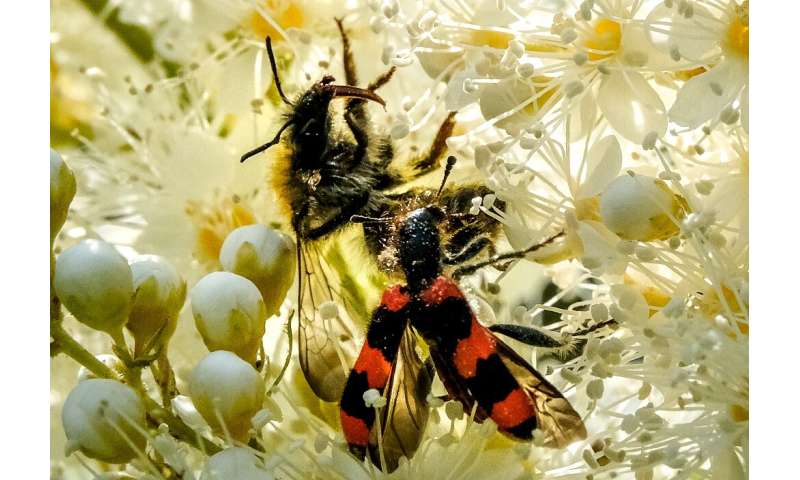https://phys.org/news/2020-08-germany-dim-night-insects.html
Sundown could mean bright lights must go out in future for German cities like capital Berlin.
In a draft law seen by AFP, the country's environment ministry has drawn up a number of new measures to protect insects, ranging from partially outlawing spotlights to increased protection of natural habitats.
"Insects play an important role in the ecosystem...but in Germany, their numbers and their diversity has severely declined in recent years," reads the draft law, for which the ministry hopes to get cabinet approval by October.
The changes put forward in the law include stricter controls on both lighting and the use of insecticides.
Light traps for insects are to be banned outdoors, while searchlights and sky spotlights would be outlawed from dusk to dawn for ten months of the year.
The draft also demands that any new streetlights and other outdoor lights be installed in such a way as to minimise the effect on plants, insects and other animals.
The use of weed-killers and insecticides would also be banned in national parks and within five to ten metres of major bodies of water, while orchards and dry-stone walls are to be protected as natural habitats for insects.
The proposed reforms are part of the German government's more general "insect protection action plan", which was announced last September under growing pressure from environmental and conservation activists.
 Bavarians were unexpectedly enthusiastic about saving bees in a 2019 petition.
Bavarians were unexpectedly enthusiastic about saving bees in a 2019 petition.Attention will now turn to the agriculture ministry, which is under pressure to deliver on promises such as an overall reduction in the use of pesticides.
Most notably, Germany said last September that it would phase out the controversial weed killer glyphosate as part of the insect action plan.
On Wednesday, environmentalists welcomed the draft law but urged further action from the agriculture ministry.
"We will not stop insect decline with tinkering alone," said Rolf Sommer, a director at the German chapter of the World Wildlife Fund (WWF).
The environment ministry's proposals were "a starting block for more insect protection", but more reforms were needed to pesticide regulations he added.
The German Nature Conservation Association (DNR) meanwhile called on agriculture minister Julia Kloeckner to "do her homework" and deliver on the promise to phase out glyphosate by 2023.
In the past year, Germany has repeatedly made headlines with its efforts to protect insects.
Last April, the state government of Bavaria was caught off guard by a wildly popular petition calling for greater protection of bees.
Rather than putting the petition to a referendum, the state simply passed it straight into law after 1.75 million people signed it in a matter of months.
Earlier this year, electric car giant Tesla faced delays to the construction of its new "gigafactory" outside Berlin due to the relocation of several ant colonies away from the building site.
Mobile phone radiation may be killing insects: German study
SEPTEMBER 17, 2020
Radiation from mobile phones could have contributed to the dramatic decline in insect populations seen in much of Europe in recent years, a German study showed Thursday.
On top of pesticides and habitat loss, increased exposure to electromagnetic radiation is "probably having a negative impact on the insect world", according to the study presented in Stuttgart, which is yet to be peer reviewed.
The analysis of 190 scientific studies was carried out by Germany's Nature and Biodiversity Conservation Union (NABU) together with two NGOs, one from Germany and one from Luxembourg.
Of the 83 studies deemed scientifically relevant, 72 showed that radiation had a negative effect on bees, wasps and flies.
These effects ranged from a reduced ability to navigate due to the disturbance of magnetic fields to damage to genetic material and larvae.
Mobile phone and Wi-Fi radiation in particular opens the calcium channels in certain cells, meaning they absorb more calcium ions.
This can trigger a biochemical chain reaction in insects, the study said, disrupting circadian rhythms and the immune system.
"The study shows that we must keep our eyes open in all directions when analysing the causes of the dramatic insect decline," said Johannes Enssle, head of NABU in the state of Baden-Wuerttemberg.
"The subject is uncomfortable for many of us because it interferes with our daily habits and there are powerful economic interests behind mobile communication technology," Enssle said.
Peter Hensinger of the German consumer protection organisation Diagnose Funk said closer attention must be paid to the possible negative effects of radiation on both animals and humans, particularly with regard to the introduction of 5G technology.
Networks equipped with 5G are expected to offer speeds 100 times faster than existing 4G networks, but the technology has been met with strong opposition from some quarters, especially among environmental campaigners.
https://disqus.com/home/forum/lifeofearth/
https://chuckincardinal.blogspot.com/



No comments:
Post a Comment
Stick to the subject, NO religion, or Party politics